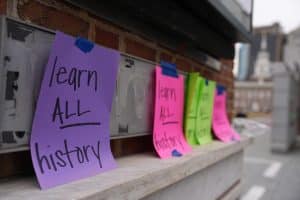When the Office of Management and Budget issued Memorandum M-25-13 on January 27 suspending distribution of federal funding until “all Federal financial assistance programs and supporting activities” could be made consistent with the “President’s policies and requirements” – everyone from social security recipients to public housing social workers feared for their immediate and long-term future.
The day the federal funding freeze was announced, a message went out to every continuum of care (COC – that’s the name used by HUD for community organized homelessness response teams) – explaining that technical assistance would no longer be provided.
The Bucks County Beacon received a copy of a memo that this “Community Compass Program is paused.” That’s the HUD program that provides technical support to every agency working to eliminate homelessness regardless of whether they receive federal support or not.
M-25-13 caused widespread panic and, in the wake of an enormous outcry and a rapid-fire legal response, the Office of Management and Budget issued Memorandum M-25-14 – rescinding the freeze.
In addition to huge urban projects, the agency funds low-income housing.
With an alphabet soup of homelessness programs, HUD provides technical assistance to communities and agencies across the nation – including Bucks County. And while many federal websites have deleted their information – Bucks County agencies, like this one to access assistance – are still online.
While many advocates for housing those experiencing homelessness breathed a sigh of relief when OMB withdrew their memo, President Trump’s prior executive order suspending all DEI activities had already decimated much of the HUD homelessness response infrastructure.
Within hours of the inauguration, the president issued an executive order “Ending radical and wasteful government DEI programs and preferencing.” By the next day, stop work orders had gone out across the country and agencies began firing anyone dealing with DEI or anyone deemed a DEI hire – a workforce hired to assure that communities worked to end homelessness in an efficient manner.
“People with lived experience should be at the center of [this] work. It is good practice.”
A HUD technical assistance (TA) provider – going by the name of “Grace” (not her real name) – who travels the nation assisting rural communities support their unhoused neighbors – spoke with the Bucks County Beacon on the condition that the news outlet protect her identity. “Because ours [the TA program to help communities] had a subsection that was built to be able to respond to requests that did come up for equity support, that entire thing has been cancelled.” Five TA admins had been hired for that cohort. “In a matter of 24 hours we had to email those communities and say, ‘we can no longer work with you.’”
Grace continued, “We have colleagues who lost all of their work. And you know who those mostly are? People of color and people who have experienced homelessness previously.”
Under the new executive order, in addition to people of color and those who identify as LGBTQ, folks with prior lived experience with homelessness have been deemed DEI hires. Grace explained, “because they were brought on for this every inclusive approach to communities.”
Donald Whitehead, the executive director of the National Coalition for the Homeless – who likewise has lived experience with homelessness – commented on homelessness being reclassified as some form of affirmative action instead of evidence of valuable knowledge. “People with lived experience should be at the center of [this] work. It is good practice.”
READ: Homelessness in Bucks County Rose 25 Percent in 2024, Exceeding Alarming Nationwide Trend
Whitehead also pointed out that prior lived experience is not an indicator of race or gender. “The people with lived experience can come from any demographic, any ethnic background – they’re not exclusively people of color, so if [the president’s order] is saying you have to stop work on people with lived experience because [the hiring of those people] it’s somehow disproportionately affects white people is a real ignorance toward the issue of people with lived experience.”
But Whitehead goes on to point out that this ignorance is the point. “DEI now has become a substitution for the N-word.”
And, Whitehead points out, it’s likely that the administration assumes people with lived experience to be people of color. “By demonizing people of color, the LBGTQ population, you really start to enhance some of those cultural landmine issues that we’ve been seeing the past many years.”
In support of Whitehead’s point, however coincidentally, all the persons who have lost contracts or jobs because of the DEI ruling – that were interviewed by Bucks County Beacon for this story – have been white.
“Jo” – who likewise spoke with the Bucks County Beacon on the condition of anonymity, was hired to work on a contract specific to race and gender equity – specifically because of the time that Jo spent living on the street. When the executive order went down, Jo received an immediate stop work order.
And while a moment of personal hardship – Jo also sees case management and outreach suffering from this decision. “Homelessness still exists because we don’t have people with lived experience at the tables creating the policies, creating the systems and the structures. When we really bring people with lived experience to the table, that’s where we see the reductions in homelessness.”
With the immediate termination of this HUD contract, Jo is again at risk of becoming homeless.
Grace said that the damage done to people like Jo is no surprise. “Talk about re-traumatization on a personal level – for all of them. It just goes all the way down. We have the equal access rules being pulled.”
Grace says that it’s no surprise. The administration should know the damage it’s doing. She remembers the last time they did things like this… “at the end of the [last] trump administration where the protections for trans people were undone. Now we’re back to that again. I can’t even, four years from now, even think of what that means.”
Pennsylvania Human Relations Commission Executive Director Chad Lassiter is stunned by the concept that prior experience could be a reason for discrimination. It shouldn’t happen to, “any person, ‘my lived experience, I used to be a former drug addict, my lived experience, I used to be a former homeless person. My lived experience, I battled back from cancer, whatever the case may be.’”
Lassiter and his staff stand ready to investigate any and all claims of such bias. “If you feel you have been the victim of illegal discrimination, file a complaint or report a bias incident with the PHRC.”
“Homelessness still exists because we don’t have people with lived experience at the tables creating the policies, creating the systems and the structures.”
Lassiter knows he’s asking a lot from people who just lost work, or homes. Still, he says, “Their best action – and I’m not making this sound like it’s easy cause often times there is that paralysis of silence where a person doesn’t know what to say what to do – but if a person feels they’ve been discriminated against they need to reach out to PHRC.” It’s free and it’s confidential.
In Bucks County specifically, PFLAG’s Rachel Fitzpatrick and Jessica Dziobecki told the Bucks County Beacon that one of the best ways a person experiencing homelessness, a fired HUD worker, or any member of the LGBTQ community can deal with the paralysis of silence Lassiter identified is to reach out for help.
“Our chapter offers 2 meetings a month, one virtual and one in-person. Since the executive orders have come out… we have seen an increase with community members wanting to attend our meetings, increased discussion, questions about what they can do to advocate, and increased support for one another.”
PFLAG provides a safe space for the community to lean on each other. “This is a time like no other to come together, to advocate, push back, and know we are not alone.”
Jo agrees and spoke openly of how important it is for community groups on the ground to come together and support each other – especially in the face of federal persecution. “How do we help communities that are truly committed to this? How do we help them to continue to move the work forward? If it’s not in the HUD TA space – which it can’t be because of the executive orders – then what? I think there are a lot of people who are really strong doing this work in their communities.”
PFLAG agrees. If you’d like to get involved Fitzpatrick and Dziobecki encourage you to “contact your state legislators and tell them to respect trans, nonbinary, and intersex kids. Regardless of where you live, this message is important for legislators to hear. Write a personal letter, visit their office, get friends and family to contact legislators. ”And donors can support PFLAG v Trump as PFLAG fights President Trump’s attacks on the trans community.







